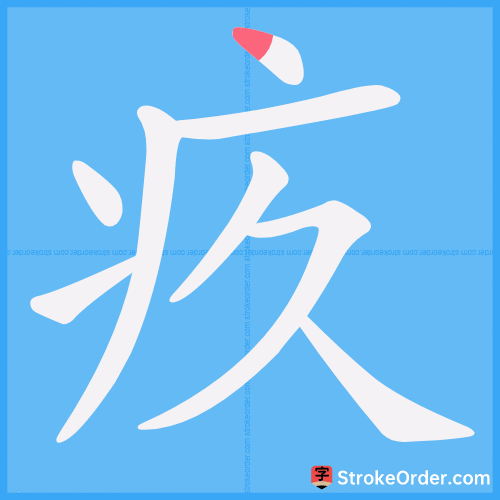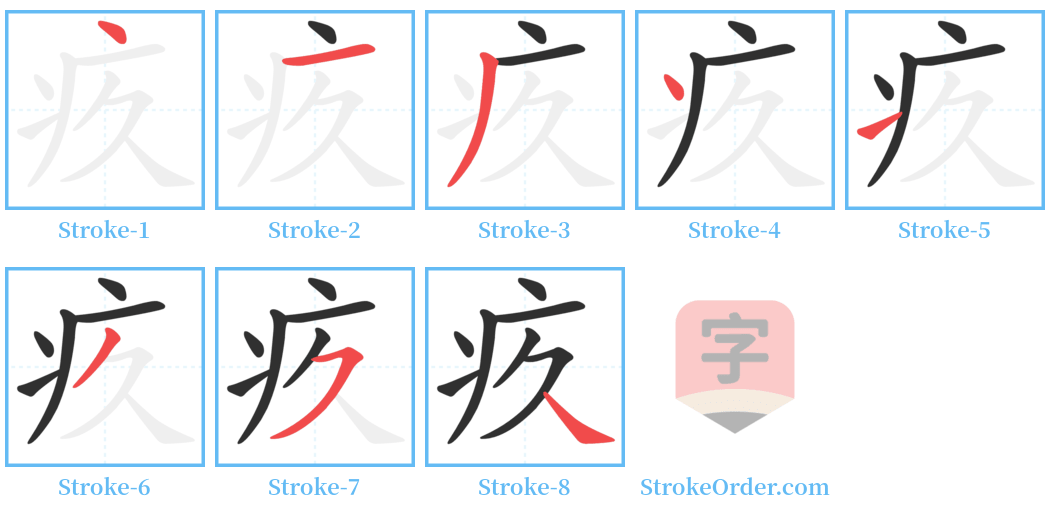疚 Stroke Order
Animated Stroke Order of 疚

Stroke Order Diagrams for 疚

Step-by-Step Handwriting Guide for 疚

Learn to Write Chinese Characters with Video Tutorials
Watch the video of writing the Chinese character "疚", learn the correct stroke order (笔顺) of the character "疚", and master the standard way of writing the character "疚".
Free Printable Handwriting Practice with Stroke Order: 疚
Printable Writing Practice Worksheet of "疚" in Portrait Orientation (Tian Zi Ge)

Printable Writing Practice Worksheet of "疚" in Landscape Orientation (Tian Zi Ge)

Information of 疚
Pinyin
jiù
Radical
疒
Strokes
8 strokes
Usage
★★★★★
Definition
chronic disease
疚 [jiù]
名:
1. 长期生病。
(Chronic illness)
2. 忧苦,特指因自己过失而造成的心内痛苦。
(Worry and distress, specifically inner pain caused by one's own mistakes:负~ (burden of guilt), 内~ (inner sorrow), 愧~ (feeling of shame), 歉~ (feeling of apology), 内省不~ (self-reflection without remorse).
引:
1. 《韩非子》:无饥馑疾疚祸罪之殃。
(No famine or disease, calamities from sins.)
例:
1. 疚病 (disease); 疚疾 (illness); 疚头怪脑 (a grotesque appearance).
2. 贫穷。
(Poverty)
引:
1. 《诗·大雅·召旻》:维昔之富不如时,维今之疚不如兹。
(Wealth of the past cannot compare to the present; current poverty is not as bad as before.)
3. 缺陷。
(Defect)
引:
1. 《国语·晋语》:行刑不疚。
(No defects in execution of justice.)
2. 《文心雕龙》:令章靡疚,亦善之亚。
(A document without defects is also considered good.)
4. 害;灾殃。
(Calamity)
引:
1. 《国语·晋语》:行刑不疚。
(No defects in execution of justice.)
2. 《易·履》:刚中正,履帝位而不疚,光明也。
(Being firm and upright, one occupies the throne without guilt, which is brightness.)
形:
1. 因有过失而感到内心惭愧痛苦。
(Feeling inner shame and pain due to one's mistakes: remorse.)
引:
1. 《诗·小雅·大东》:使我心疚。
(Caused my heart to feel guilty.)
例:
1. 疚怀 (inner unease; similar to 疚心); 疚惭 (similar to feeling of shame); 疚悔 (regret due to guilt); 疚负 (similar to mistake); 疚恶 (similar to error).
2. 忧伤;忧虑。
(Distressed; worried.)
例:
1. 疚怀 (heartbroken; worried); 疚茕 (concerned); 疚心疾首 (extremely worried).
3. 困惑。
(Perplexed; puzzled.)
引:
1. 《国语》:设之以国家之患而不疚。
(Think about the country's troubles without guilt.)
2. 《孔子家语》:行前定则不疚。道前定则不穷。
(Set rules beforehand, and there will be no guilt in actions.)
动:
1. 败坏;伤害。
(To harm or damage.)
引:
1. 《国语》:西方之书有之曰:“怀与安,实疚大事。”
(Books from the West say: "Having worries and safety is a serious matter.")
2. 《墨子》:今有负其子而汲者,队其子于井中,其母必从而道之。今岁凶民饥道饿,此疚重于队其子,其可无察邪?
(Now, if someone neglects their child, and the child falls into a well, the mother will certainly follow and lead them. In a year of famine, ignoring the starving people is a guilt heavier than neglecting a child; how can one not notice this?)
2. 痛恨。
(To hate.)
例:
1. 疚愆 (feeling of guilt or resentment).
3. 居丧。
(To be in mourning.)
引:
1. 潘岳《寡妇赋》:自仲秋而在疚兮,逾履霜以践冰。
(Since mid-autumn, I have been in mourning, stepping on frost and ice.)
Input Method for 疚
Pinyin
jiu4
Wubi
uqyi
Cangjie
kno
Zhengma
trs
Four Corner
00187
Unicode
U+759a
Same Pronunciation Characters